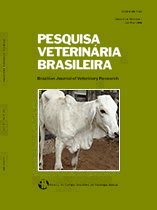 |
|
|
|
Year 2015 - Volume 35, Number 1
|

|
Plasmodium spp. and Haemoproteus spp. infection in birds of the Brazilian Atlantic Forest detected by microscopy and polymerase chain reaction, 35(1):67-74.
|
ABSTRACT.- Tostes R., Vashist U., Scopel K.K.G., Massard C.L., Daemon E. & D’Agosto M. 2015. Plasmodium spp. and Haemoproteus spp. infection in birds of the Brazilian Atlantic Forest detected by microscopy and polymerase chain reaction. Pesquisa Veterinária Brasileira 35(1):67-74. Curso de Pós-Graduação em Ciências Veterinárias, Instituto de Veterinária, Universidade Federal Rural do Rio de Janeiro, BR-465 Km 7, Seropédica, RJ 23890-000, Brazil. E-mail: raquelctostes@yahoo.com.br
In recent years haemosporidian infection by protozoa of the genus Plasmodium and Haemoproteus, has been considered one of the most important factors related to the extinction and/or population decline of several species of birds worldwide. In Brazil, despite the large avian biodiversity, few studies have been designed to detect this infection, especially among wild birds in captivity. Thus, the objective of this study was to analyze the prevalence of Plasmodium spp. and Haemoproteus spp. infection in wild birds in captivity in the Atlantic Forest of southeastern Brazil using microscopy and the polymerase chain reaction. Blood samples of 119 different species of birds kept in captivity at IBAMA during the period of July 2011 to July 2012 were collected. The parasite density was determined based only on readings of blood smears by light microscopy. The mean prevalence of Plasmodium spp. and Haemoproteus spp. infection obtained through the microscopic examination of blood smears and PCR were similar (83.19% and 81.3%, respectively), with Caracara plancus and Saltator similis being the most parasitized. The mean parasitemia determined by the microscopic counting of evolutionary forms of Plasmodium spp. and Haemoproteus spp. was 1.51%. The results obtained from this study reinforce the importance of the handling of captive birds, especially when they will be reintroduced into the wild. |
| |
|
|
| |
|
 |